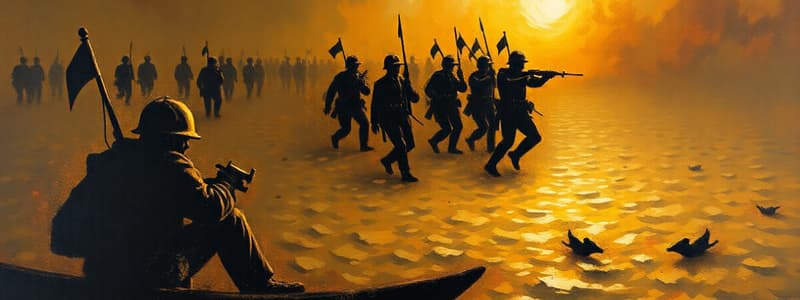Podcast
Questions and Answers
What was the primary reason the U.S. supported Saddam Hussein during the Iran-Iraq War?
What was the primary reason the U.S. supported Saddam Hussein during the Iran-Iraq War?
- To protect American oil interests
- To establish a long-term alliance with Iraq
- To counter Iran's hostility towards the U.S. (correct)
- To promote democracy in the region
What does the principle of chivalry historically imply about the treatment of non-combatants?
What does the principle of chivalry historically imply about the treatment of non-combatants?
- They can be targeted if they support the enemy.
- They are irrelevant to the considerations of combat.
- They should be protected from deliberate harm. (correct)
- They are considered enemies in warfare.
Which era showed a marked improvement in the protection of civilian populations during warfare?
Which era showed a marked improvement in the protection of civilian populations during warfare?
- The Medieval era
- The 21st century
- The mid-1800s (correct)
- The 20th century
How has the perception of chivalry changed from the past to the present?
How has the perception of chivalry changed from the past to the present?
What moral dilemma is highlighted regarding advanced weaponry in modern warfare?
What moral dilemma is highlighted regarding advanced weaponry in modern warfare?
What was a key change in warfare practices leading up to the Civil War?
What was a key change in warfare practices leading up to the Civil War?
What has largely replaced the moral reasoning that guided earlier warfare practices?
What has largely replaced the moral reasoning that guided earlier warfare practices?
What does collective guilt assume in the context of war?
What does collective guilt assume in the context of war?
What significant impact did the reparations have on Germany after World War I?
What significant impact did the reparations have on Germany after World War I?
How did the actions of the British and French governments contribute to World War II?
How did the actions of the British and French governments contribute to World War II?
What was the unemployment rate in Germany during the Great Depression?
What was the unemployment rate in Germany during the Great Depression?
What rationale did U.S. officials have for supporting the Shah of Iran despite his dictatorial actions?
What rationale did U.S. officials have for supporting the Shah of Iran despite his dictatorial actions?
Who rose to power in Germany due to the desperation caused by economic conditions post-World War I?
Who rose to power in Germany due to the desperation caused by economic conditions post-World War I?
What is suggested as a common catalyst for war according to the content?
What is suggested as a common catalyst for war according to the content?
Which historical event led to the British and French governments imposing reparations on Germany?
Which historical event led to the British and French governments imposing reparations on Germany?
Flashcards
Collective Guilt
Collective Guilt
The belief that all members of a group are responsible for the actions of a few, even if they were not involved or opposed to those actions.
Encroachment
Encroachment
The tendency for a nation to expand its territory or influence, often leading to conflict with other nations.
War-Monger
War-Monger
A political leader who uses deception and manipulation to instigate war, often by portraying it as beneficial to the nation's interests.
The Lesser of Two Evils
The Lesser of Two Evils
Signup and view all the flashcards
Reparations
Reparations
Signup and view all the flashcards
Economic Devastation
Economic Devastation
Signup and view all the flashcards
State Terrorism
State Terrorism
Signup and view all the flashcards
Inciting War
Inciting War
Signup and view all the flashcards
Chivalry
Chivalry
Signup and view all the flashcards
Civilian Casualties in Warfare
Civilian Casualties in Warfare
Signup and view all the flashcards
Moral Reasoning in Warfare
Moral Reasoning in Warfare
Signup and view all the flashcards
Majority Rule
Majority Rule
Signup and view all the flashcards
Barbarism with Laser-Guided Bombs
Barbarism with Laser-Guided Bombs
Signup and view all the flashcards
From Soldiers to Civilians
From Soldiers to Civilians
Signup and view all the flashcards
The Unacceptability of Killing Innocents
The Unacceptability of Killing Innocents
Signup and view all the flashcards
Study Notes
War as an Unsolved Problem
- War is the worst unsolved problem, involving millions killed annually, violating ethical principles.
- Eliminating war entirely is improbable; political leaders will always instigate conflict.
- Deceptive political reasoning is used to gain support for war.
- Example: historical misrepresentation of national interests.
- Power acquisition and use are potent motivators for war.
- Collective guilt, the assumption individuals share blame for actions of others, fuels conflict.
- Post-World War I Germany faced crushing reparations and collective guilt – harming their economy and fostering resentment.
- Political encroachment to other countries' affairs can lead to significant conflict:
- US support of the Shah of Iran (ultimately causing further animosity).
Chivalry and Modern War
- Chivalry, a code of conduct in war, previously protected non-combatants (children, women, elderly).
- This was a principle of common law.
- 20th century saw a decline in chivalry, where civilians were increasingly targeted and killed.
- Modern warfare uses sophisticated technology yet lacks ethical frameworks.
- Modern soldiers, operating within command structures, are prepared to commit mass murder without remorse.
- The concept of "majority rule" is a primitive system replacing ethical standards in modern conflicts.
Historical Examples
- World War I, resulting in collective guilt and punishment for Germany, setting the stage for WWII.
- The Shah of Iran was supported for political reasons, and U.S. policy backfired.
- Saddam Hussein is presented as a similarly detrimental conflict.
Studying That Suits You
Use AI to generate personalized quizzes and flashcards to suit your learning preferences.




